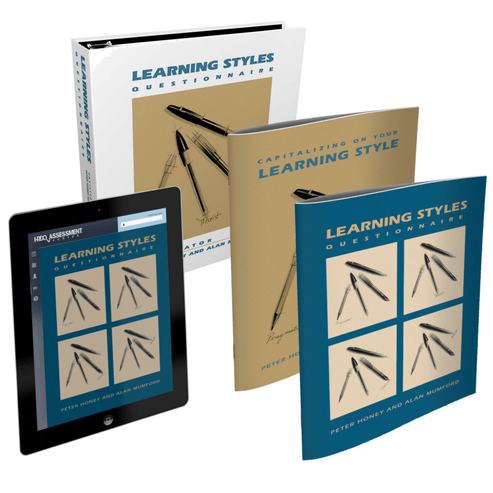Share
Four Types of Learning Styles: Which Type Are You?
Bradford R. GlaserWe learn something new every day. But are we truly learning in a way that allows us to retain information best? And are we putting ourselves in situations that align with our learning needs? If you don’t know your preferred method of learning, the answer is likely “no.” Below, we’ve outlined four types of learning style and their differences so you can identify which type you are. This knowledge will allow you to better understand your learning preferences to get the most out of your training and other educational endeavors.

- Identify your learning style
- Maximize learning strengths
- Expand learning style range
Table of Contents
An Introduction to Learning Styles

Before diving into a specific learning style, it’s essential to understand its origins. The learning styles we present here were developed by renowned learning specialists Peter Honey and Alan Mumford. These styles are measured by examining general behavioral tendencies, not perceived beliefs. Honey and Mumford suggest that capitalizing on your natural preferences is the key to unlocking your learning potential. However, in order to be a truly effective learner, it’s best to have abilities in each of the other styles, as well.
Honey and Mumford also suggest that having a thorough understanding of your learning style allows you to do the following:
- Increase awareness of learning skills and processes
- Expand the number of experiences in which you benefit
- Understand the opportunities that are the best fit for your learning needs
Now, let’s explore the four primary learning styles!
Activist
Those who embody the Activist learning style must get their hands dirty to fully grasp a new concept. They best process information by doing rather than watching and often have a very open mind when tackling new subjects. In fact, they tend to eagerly immerse themselves in the learning process, leaving bias at the door. Activists are quite optimistic individuals who are usually ready and willing to accept change. Some activities that they tend to thrive at include problem-solving, competition, group discussions, and brainstorming.
However, there are also weaknesses to the Activist learning style. First, they tend to act sporadically and without thinking because they are so eager to learn. They often take unnecessary risks and rush through tasks without thoroughly preparing.
Pragmatist

In order for those with the Pragmatist learning style to retain information, they have to understand how the information applies to the real world. They feel that doing things in practice is pointless and uninteresting if they can’t put it into action in their own life. Pragmatists find limited use in abstract concepts. Instead, they enjoy experimenting with new methods and ideas to test if they work. In addition, they best learn when they have plenty of time to think through how to apply the subject in reality.
Regarding weaknesses, Pragmatists readily reject information they do not view as applicable. They often run with the first answer they conclude about a problem, rather than exploring all possibilities. They’re also very impatient when it comes to group speculation and talking for the sake of discussion.
Reflector
People with the Reflector learning style are all about observation. Rather than jumping into the action themselves, they sit back and view situations from a variety of perspectives, gathering data and drawing conclusions as they go. They enjoy spending time reflecting on information and sifting through what they learned through their observations. Some methods of learning they enjoy include feedback, self-analysis, questionnaires, and coaching.
Reflectors will avoid direct participation at all costs – unlike activists, they do not like to get their hands dirty. They are not risk-takers but instead tend to be overly cautious and calculated. In addition, it often takes Reflectors a long time before forming an opinion or making a decision because they must analyze all the facts they’ve collected.
Theorist

Those with the Theorist learning style are always asking “why.” They want to know the theory behind the actions to find meaning in a new concept. They rely heavily on models, facts, and ideas to engage them throughout the learning process. Theorists enjoy analyzing and synthesizing new information to create new, systematic “theories.”
The downside to this style of learning is that Theorists have minimal capacity for lateral thinking – that is, they’re not great at coming up with creative solutions or problems in a different light. They deny anything that is seemingly subjective, and for them, solutions need to be framed as “musts.” Theorists are also very intolerant of change and ambiguity.
Improve Learning Skills with HRDQ
We hope you enjoyed learning about these four types of learning styles! If you’re not sure which type you are, the Learning Styles Questionnaire will determine your exact style. Or, to discover more ways to improve your learning skills, be sure to explore the complete HRDQ Learning Collection! Our training consultants will equip you and your team with the tools to thrive and retain information better. Start developing your team today!





















































